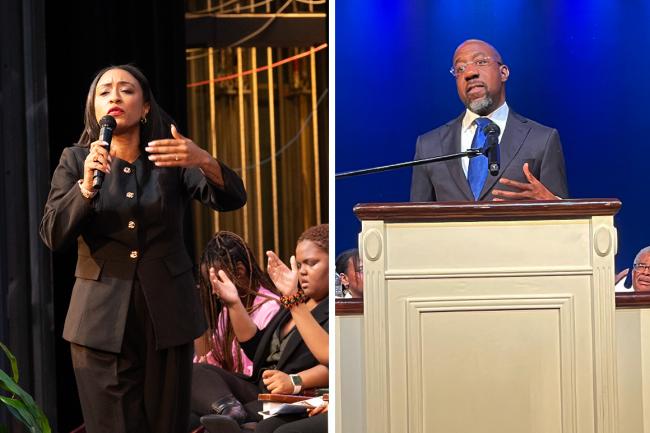Photo above: (left) Rev. Neichelle R. Guidry, Ph.D. and Rev. Raphael Warnock, Ph.D.
The Andrew Rankin Memorial Chapel Services may be held in Howard's Cramton Auditorium, but for the past two weeks, SpelHouse has been in the building. As the Congressional Black Caucus Foundation's Annual Legislative Conference wrapped up on September 28, Chapel featured U.S. Senator and Rev. Raphael Warnock, Ph.D., a Morehouse College alumnus and pastor of Ebeneezer Baptist Church in Atlanta, GA, formerly pastored by Martin Luther King Jr. and Martin Luther King Sr. On October 5, the rostrum was occupied by Rev. Neichelle R. Guidry, Ph.D., dean of the Chapel and the director of the WISDOM Center at Spelman College in Atlanta, Georgia.
Rev. Neichelle R. Guidry, Ph.D. speaks at Howard University's Andrew Rankin Memorial Chapel Service
"God can handle it. And God can move through it."
Rev. Dr. Guidry used 1st Kings Chapter 19, versus 9-15 and 19 as the base text for her sermon. The prophet Elijah was beset with fear and depression after learning that he, like other prophets, was being discredited and targeted with death threats. God found Elijah after he fled into a cave, and spoke to him through his pain, ultimately helping Elijah set a new course.
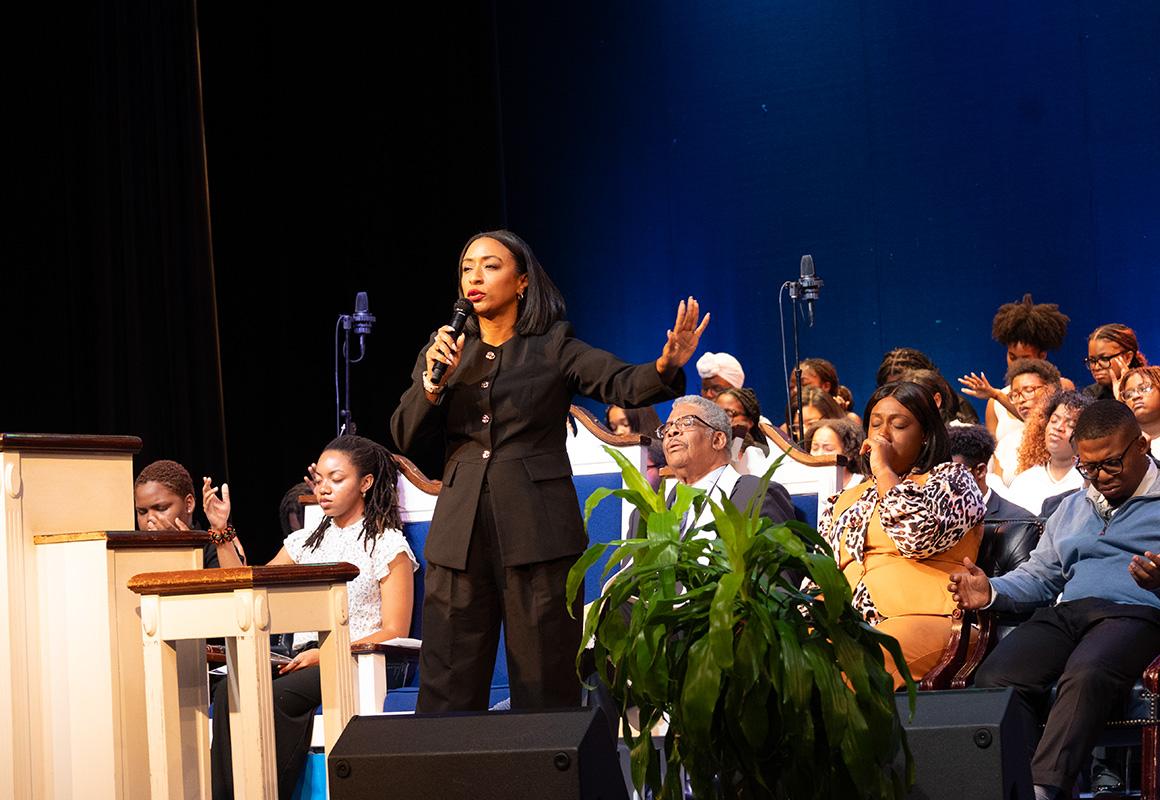
The theme of the "Message from the Mountain" was about alignment. Dr. Guidry used the example of a car out of alignment as a metaphor for Elijah's experience, noting that a car which is not in alignment is extremely difficult to drive straight. Like the car, Elijah's life, his calling, and his relationship with God were out of alignment and headed in an indiscernible direction. This led the prophet to, out of desperation and depression, ask God to take his life.
Guidry noted that people who are called to do God's work are often villainized as they take on oppressive powers and go through periods of intense suffering. She called Elijah's condition "mental and spiritual unwellness." Ultimately Elijah cried out to God, and with authenticity and honesty, explained that his pain and despondency was in part because he felt that he had been abandoned by God. God understood Elijah's situation, and instead of becoming angry that Elijah was running from his calling as a prophet, God had mercy and love for Elijah and affirmed his worth.
"What are you doing here, Elijah?" Guidry asked, quoting God's question to Elijah.
Guidry explained that God loved Elijah too much to leave him alone in his desperation and sought him out not to ridicule him, but to restore him. She acknowledged that in some seasons of life, you may find yourself out of alignment, where nothing seems to fall into place, none of your efforts seem to pay off, and no contribution or sacrifice is recognized. In fact, you may find yourself targeted for retribution, leading you to become more fearful than faithful.
"It feels like you can't help veering to the left or to the right no matter how much you try to stay centered," she said.
God used Elijah's self-isolation as an opportunity to hear the truth from him, according to Guidry. Elijah's retreat into the cave, she said, turned out to be an opportunity to get closer to God. She said that you need not feel guilty about seeking a peaceful place in order to recenter yourself. She said that God sometimes causes us to have a "cave season," which can be used as a time of rest, renewal, reflection, and relaunch. When you are at the end of your ingenuity and resources, she said, you may have to go through a "cave season," during which you may feel lonely and abandoned, but in which you are really in a position where you alone are in the center of God's gaze.
"Sometimes we meet God not in our strength, but we meet God in our weakness," Guidry said. "Sometimes we meet God in our weariness and our exhaustion, in our wavering trust and our shaky faith. But I'm so glad today that we serve a God who is so connected, and God knows exactly where to find us right where we are."
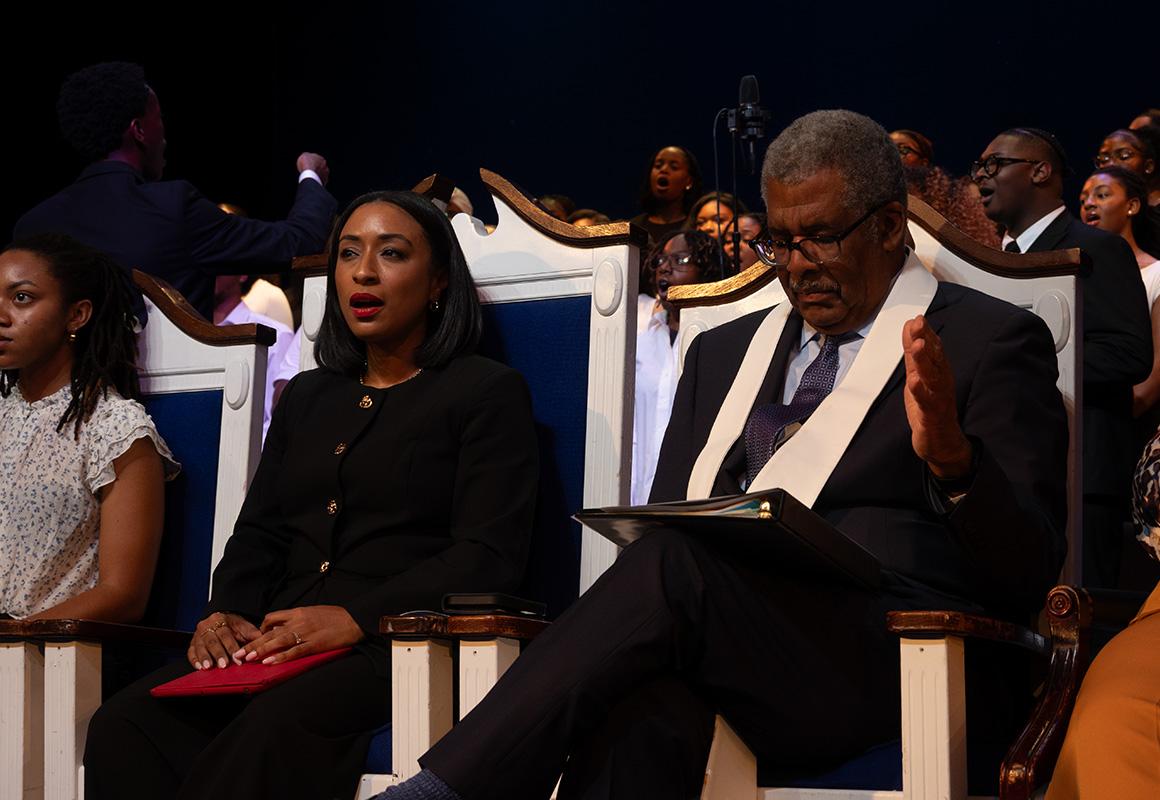
Eventually, God told Elijah to come out of the cave. After Elijah came out of his isolation, he took a 40 day journey to Mt. Sinai, where Moses received the Ten Commandments from God. Dr. Guidry said that you don't have to take a 40 day journey to meet with God; however, you can meet God wherever you are. She noted that God didn't wait for Elijah to "get his act together," before he met Elijah. God heard Elijah as he brought his pain and his disappointments to God and recognized Elijah's authentic truth.
"God doesn't rebuke him for his honesty," Guidry said. "Instead, this is the moment that everything begins to turn around for Elijah."
Guidry told the audience that Elijah's conversation with God was an example of how we can approach God as we come out of our own metaphorical "caves." She said that the condition of your heart matters to God. When you can't handle it yourself, you can come to God and lament to him transparently, "I need You to do what only You can do." That vulnerability allows God to begin to make things happen and prepares us to receive the blessings from God which allow us to move on from our tragedy.
"Can you tell God the truth of what you feel?" she asked. "Yes, God, I'm grateful, but I'm also very upset right now. Yes God, I believe you, but you are making it hard for me to believe you, God. I really need for you to help me in this place I am in. God can handle it, and God can move through it."
Importantly, Guidry said that once we come out of the cave, we have to take steps, even if imperfect, to follow God's guidance. God doesn't require our perfection, she said, but he does require our effort.
"There is a thin line between being still and getting stuck," Guidry said.
The Honorable Rev. Raphael G. Warnock, Ph.D. speaks at Howard's Rankin Memorial Chapel Service.
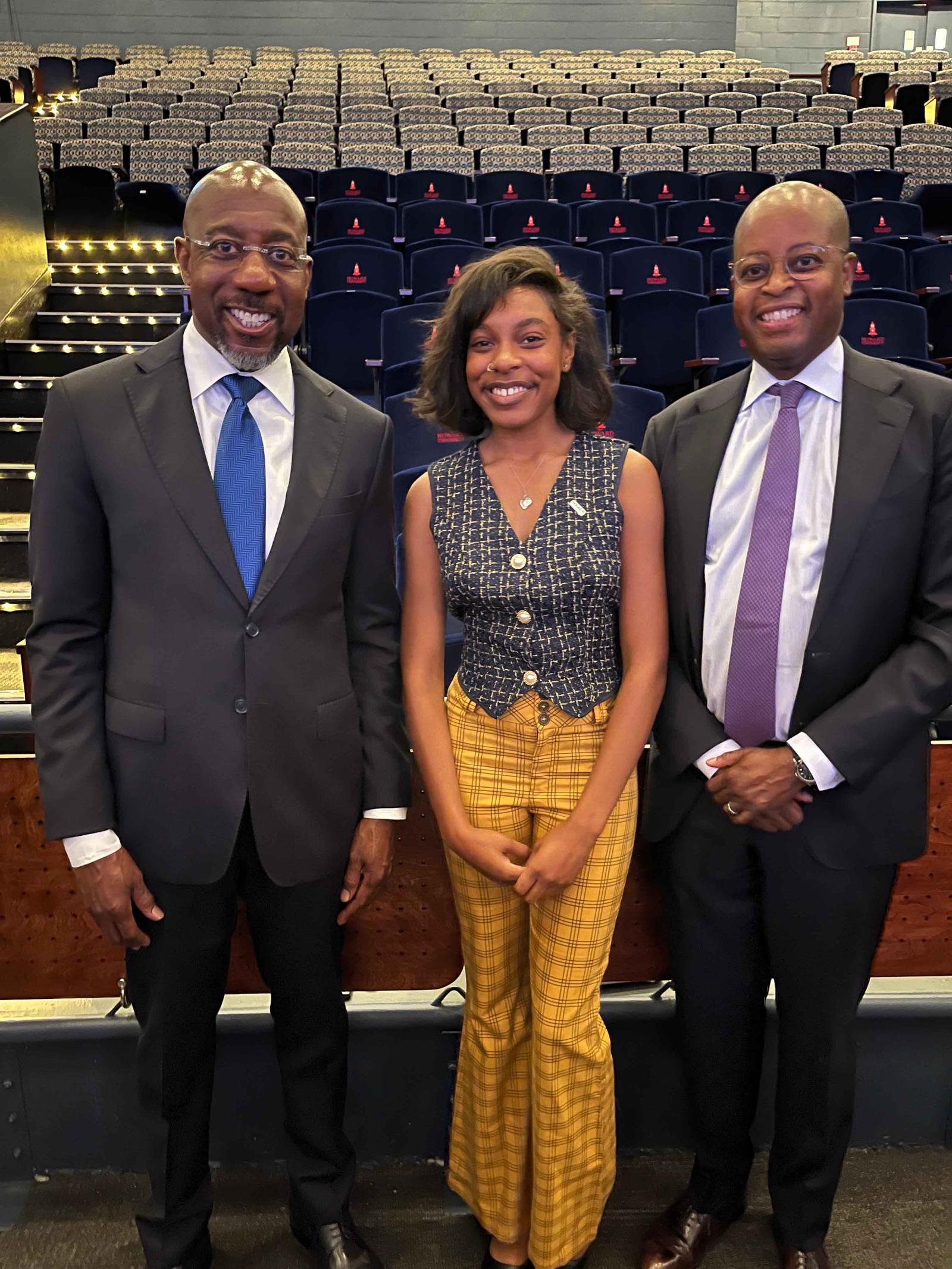
In his sermon a week earlier, Rev. Warnock referenced the Bible's Matthew Chapter 11's 7-11 verses. The chapter set the theme for Warnock's sermon, titled "God's Victory Over Violence." The chapter points out that even the Kingdom of God has suffered violence.
Warnock referenced the life and impact of John the Baptist. He noted that John often angered those in power. Truth telling is dangerous, Warnock said, but "holy mischief" is needed in order for transformation to happen.
"Telling the naked, unadulterated truth on a world system built on lies will get you in trouble," he said. "But John Lewis called it 'good trouble.'"
Knowing the truth is critical to solving problems, even if the truth is uncomfortable, Warnock said. He argued that individuals and nations need to confront the truth about themselves instead of trying to hide it through actions like book burning. Unlike the promise and beauty of God, Warnock warned that we are today disparaging difference and diversity.
According to Warnock, John tried to tell the truth about King Harrod's empire, which was crumbling because of its values. John's ministry was so impactful that people ventured deep into the woods in order to hear his words. Even Jesus bragged about John. His popularity threatened Herrod, who imprisoned John and ultimately had him beheaded.
Warnock said that the Kingdom of God is at hand and that liberty is coming, which is good news. The bad news, he said, is that there is violence all around us. In fact, he said, political violence has been a part of America for most of its history. But beyond that, Warnock said, conditions like extreme poverty are also a form of violence, especially in a nation awash in affluence.
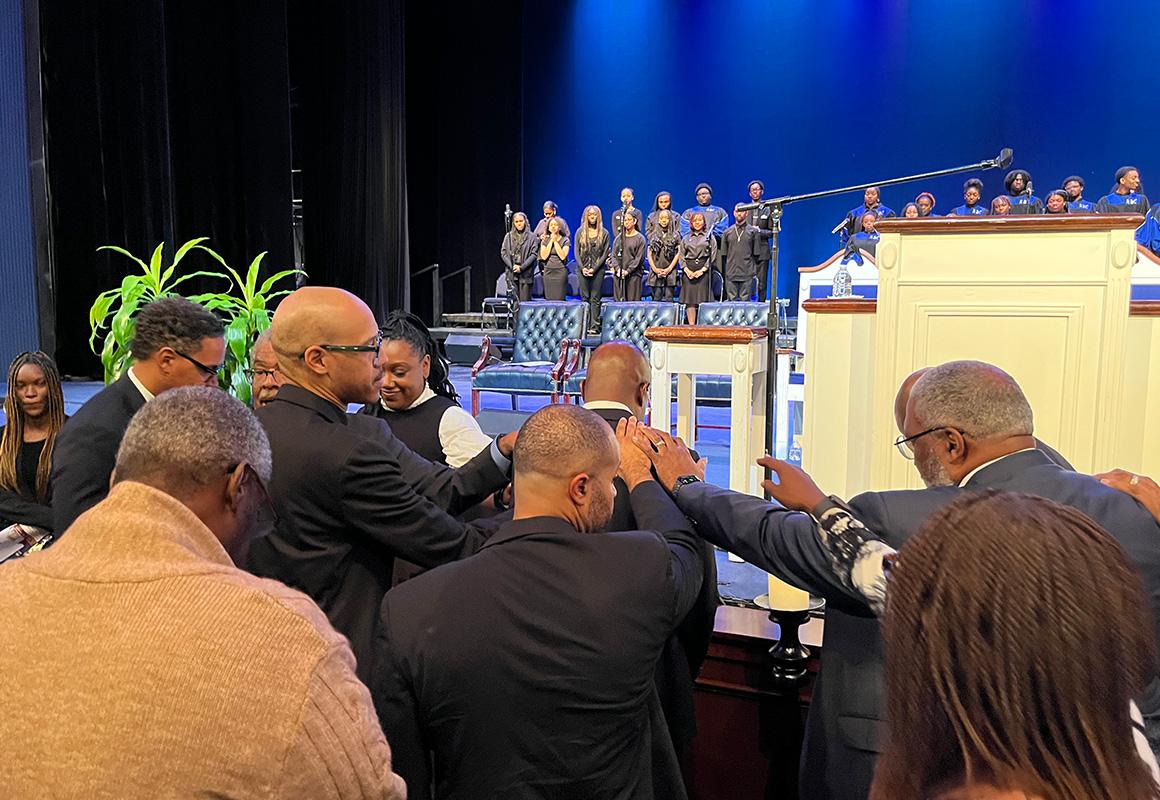
Though the truth eventually led to John's death and caused Jesus to be crucified, Warnock said that their impact cannot be denied.
"Herod was impressed with himself, and Caesar was impressed with himself," Warnock said. "But have you noticed, nobody sings hymns about Herod? Nobody sings songs to Caesar. But from the east to the west, from the north to the south, in churches and chapels all across the world, they sing, 'all hail the power of Jesus's name.'"
Towards the end of the service, Wayne A. I. Frederick, M.D., MBA, Howard's interim president, president emeritus, and the Charles R. Drew professor of surgery, asked Howard Chapel Dean Bernard L. Richardson, Ph.D., to pray for Warnock and his work on behalf of the country. Richardson and other elders from the audience placed their hands on Warnock as they prayed for God's guidance.
Chapel services are held at 11:00 a.m. during the academic year in Howard's Cramton Auditorium and are streamed live on the Chapel's Youtube channel.
Keep Exploring
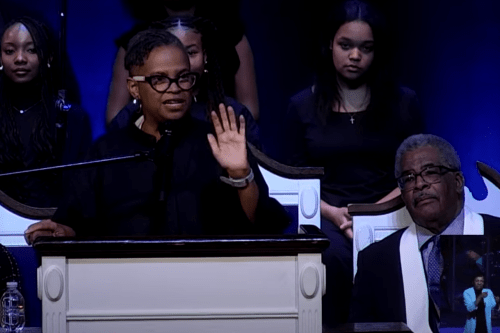
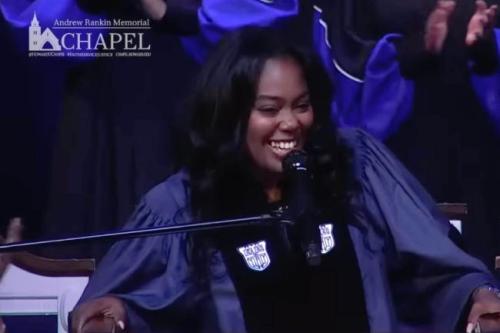
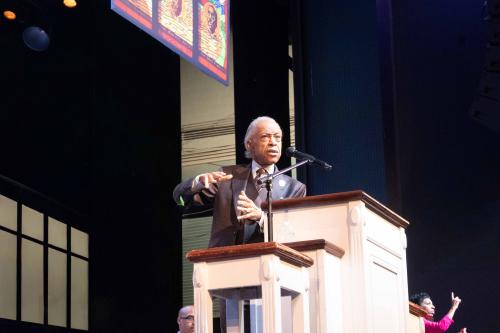
Rev. Al Sharpton Rallies Howard Community to ‘Fight Giants’ Ahead of March on Wall Street Event
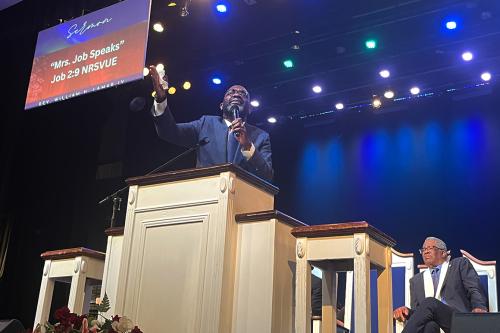
Rev. William Lamar IV Urges Students to Lift One Another Up Even During Trying Times
Keep Reading
-
 News
NewsHoward School of Social Work Students Travel to Cape Town to Serve the Community
Feb 11, 2026 5 minutes -
 Uplift
UpliftService, Scholarship, and the Dream in Action: Howard University Inspires the Next Generation on MLK Day
Jan 23, 2026 2 minutes -
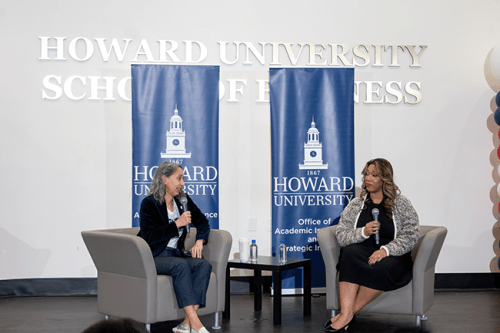 News
NewsHU-MasterCard Inclusive Growth Thought Leadership Lecture Series Kicks Off Howard’s 2026 Data Week
Feb 20, 2026 5 minutes
Are You a Member of the Media?
Our public relations team can connect you with faculty experts and answer questions about Howard University news and events.
Submit a Media Inquiry

